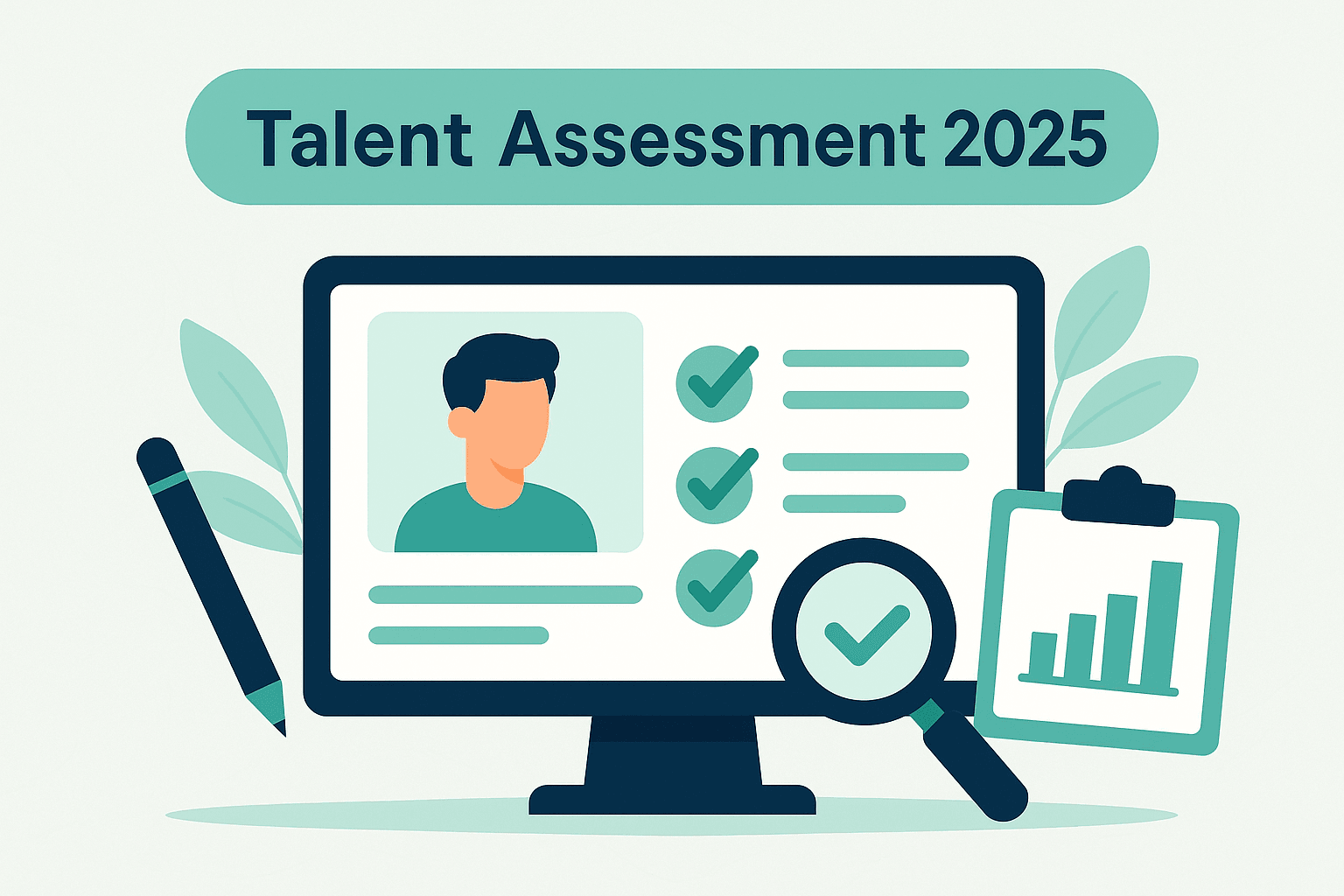Talent Assessment: How to Evaluate, Score, and Hire Right in 2025
Updated : 5 months ago

Hiring the wrong candidate in 2025 is more expensive than ever.
You lose your valuable time, productivity, and often damage your team morale. It is all because of hectic and rushed interview decisions. That's where talent assessment comes in.
Today's work is a complete hybrid. There are AI-powered resumes and disappearing attention spans. So, if you are still relying on your gut feeling, it's not just risky, but outdated. Recruiters and HRs need faster, smarter, and data-backed ways to choose the right candidate before the final interview.
That's what modern talent assessment solves.
Whether you are checking skills, testing cognitive abilities, or finding the right team fit, assessments can help you reduce any guesswork and increase hiring accuracy. And with platforms like uRecruits, it's easier than ever to integrate assessments directly to your hiring pipeline.
Key Takeaways
- What talent assessment actually means in 2025?
- The top types of assessments that work today.
- How to choose the right tools depending on the role.
- The top types of assessments that work today.
- How to choose the right tools depending on the role.
- Some mistakes to avoid when getting started.
What Talent Assessment Actually Means in 2025?

Talent assessment in 2025 is not just about taking a personality quiz or checking out a pre-employment test. It's more about a strategic process. It is designed to evaluate a candidate's potential to succeed in a specific role. For that, the recruiters use a mix of data, behavior, skills, and prediction.
It goes even beyond the resumes, years of experience, and traditional interviews. What happens is that the great candidates often get filtered out too early. However, the average ones slip through just because they interview well.
Here is what talent assessment is in 2025 -
- A structured method to check skills, culture fit, competencies, and future potential.
- It is powered by AI and automation to reduce any biasness and improve speed.
- It is integrated into your ATS and hiring workflow.
- Customizable depending on the role type, seniority, and team.
- Scalable across remote teams and high-volume hiring.
And here is what talent assessment is not -
- A one-size-fit test for all that treats all candidates the same.
- A replacement for good interviews - it improves them not replaces them.
- A checkbox that needs to be ticked only at the final round.
- Just personality tests
- Manual, paper-based process.
Today, it matters more than ever. Hiring is faster and more competitive. However, there are also distractions, noises, and misleading signals. People create resumes.
Some even use AI to create them. Interview rehearsals are normal, and candidates say that you want to hear.
Talent assessments cut all of these.
They provide you with real signals about how applicants think, solve problems, learn, and fit to the culture. You know them even before the zoom calls.
Benefits of Talent Assessment

Talent Assessments are no longer just "nice-to-have" for HR teams. Today, they are an important edge - especially when hiring at scale, across remote teams, or for the roles that demand more than just surface-level skills.
Here is what you gain when you integrate smart, AI-powered assessments into your hiring process.
1. Hire faster without compromising on Quality
Checking out hundreds of resumes manually takes a lot of time and let's be honest most of them don't even leave a mark. With talent assessments, you can easily identify who meets the bar before you even invest in the interviews.
Recruiters using uRecruits cut screening time by up to 60% using built-in skill assessments and automated scoring.
2. Improve Quality Of Every Hire
A resume shows what someone has done. A talent assessment can help you know what that particular candidate can do next. You get a data-backed view of how applicants think, solve problems, and apply their expertise. It becomes easier to match people with their roles they will thrive in. That means there will be fewer mis-hires and longer retention.
3. Reduce Bias, Increase Fairness
Standardized assessments provide every candidate with the same opportunities to show their strength. It makes everything clear and removes unconscious biases that usually come in between the unstructured interviews.
uRecruits include DEI-friendly scoring models. These help teams analyze gender and background without sacrificing speed and accuracy.
4. Predictive Hiring Insights
Modern assessments use AI and analytics to predict a candidate's future performance. However, it does not just include their current ability. It means you are hiring not just for today's role but for long-term growth.
You can even track -
- Which assessments can lead to the top performers
- Which roles need better screening tools
- Which assessment scores relate with the retention time.
5. Improves Candidate Experience
Candidates need feedback. They are actively looking for transparency, and assessment gives them both. Well-designed assessments make your hiring process much more relevant, fair, and structured. It builds trust and keeps candidates engaged. It is especially valuable in competitive industries where the best talent is in high demand.
6. Saves Hiring Time and Costs
Every wrong hire can cost you about $15,000-30,000 or even more. It depends on the role. Talent assessments can help you avoid that by -
- Finding the red flags earlier.
- Filtering out weak candidates automatically.
- Allowing recruiters to focus only on the reliable candidates.
Types Of Talent Assessments Recruiters Use
In 2025, talent assessments are more sophisticated, role-specific, and customizable than ever before. Whether you are hiring a sales representative, software developer, or a customer success manager - the right assessment can help you check what really matters for that particular role.
Here are some of the most widely used talent assessment types that modern recruiters use -
1. Skill Assessments
These tests what a candidate can do - not just what they have done so far. Skill assessments provide you with an objective proof of competency.
Suitable for - Marketing, Engineering, Finance Data Roles
2. Cognitive Ability Tests
These measures a candidate's problem solving ability, logic, attention to details, and overall learning skills. It is among the strongest and effective predictors of job performance.
Suitable for - Any role needed fast learning or analytical thinking.
Common Formats - Logical reasoning, numerical ability, abstract thinking tests.
3. Personality and Behavioral Assessments
These check traits like conscientiousness, openness, emotional intelligence, and motivation. It provides you with a lens into how someone works, collaborates, and responds to stress.
Suitable For - Team-fit roles, remote-first teams, leadership positions.
4. Situational Judgement Tests
These present real-world scenarios and ask candidates to choose how they would respond. These are extremely useful for predicting on-the-job behavior, especially in customer-facing roles.
Suitable for - Customer services, healthcare, leadership roles.
5. Work Sample Tests
Give candidates some tasks before they are hired. You can ask them to design a mock campaign, debug a script, or write an outreach email. It allows them to show instead of just telling about their skills.
Best For - Technical, creative, and performance-driven roles.
6. Language And Communication Assessments
These are especially useful for the global or hybrid teams. These tests assess how well someone can communicate - both written and verbal.
Suitable for - Sales, remote, support, and customer-facing roles.
How To Choose The Right Talent Assessment For Each Role?
Not all roles need the same assessment. Further, not every test can provide you with the insight you actually need. In 2025, choosing the right assessment is about being strategic. Here is a role-based breakdown that helps you align assessment with actual hiring goals.
1. Technical Roles (Data Analysts, Engineers, Developers)
What to Test?
- Logical and algorithmic thinking
- Problem-solving skills.
- Code quality
- Language expertise.
Best assessment to use -
- Technical skills assessment.
- Work samples
- Logical reasoning.
2. Creative Roles (Writers, Designers, Marketers)
What to look for -
- Creativity and originality.
- Brand alignment
- Communication clarity
- Technical execution.
Best assessments to use
- Work sample tests (brief designs, writing prompts)
- Communication assessments.
- Behavioral assessments.
3. Customer-Facing Roles (Support, Sales, CX)
What To Test?
- Patience
- Objection Handling
- Verbal and Written Communication.
- Speed and Tone in interactions.
Best Assessments To Use
- Situational Judgement Tests
- Communication assessments
- Personality assessments.
4. Leadership and Management Roles
What to Test?
- Team Management
- Conflict Resolution.
- Strategic Thinking
- Emotional Intelligence.
Best Assessment to use
- Personality tests
- Situational scenarios
How to Integrate Talent Assessments Into Your Hiring Workflow?
You have chosen the right assessments. Now, how will you implement them in your workflow without slowing things?
In 2025, top recruiters are using assessment in their hiring stages. And platforms like uRecruits makes it even more effective. Here's how to do it right.
1. Set clear goals before you add the test
Before adding any sort of assessment, you need to know -
- What exactly do you want to evaluate?
- In which state do you want to take the test?
- Will it replace interviews or help in making things easier?
- How can one score or interpret the results?
2. Trigger Assessments Automatically After Resume Screening
You can automatically trigger role-based assessments once a candidate passes resume filters.
- It saves time.
- It removes bias.
- It keeps the candidates engaged.
3. Use Role-Specific Assessment Templates
Each job role can have pre-set assessments -
- Tech roles get coding tests.
- CX roles get SJTs and quizzes to check communication.
- Leadership roles get EQ and scenario-based judgement tests.
4. Auto-Rank Candidates Depending On Test Scores
Once the assessment is completed, the candidates score and rank automatically. You will see -
- Top scores at the top.
- Combined insights
- Red flags.
5. Add human review where it matters
Let the system check the top 10 and then the HRs can check them. Use interviews to know the candidates better, assess personality fit, or clarify gray areas from those tests.
Finally...
Hiring in 2025 is not about your gut feeling or good-looking resume. It's more about clarity, consistency, and confidence.
Talent assessments provide you with that edge. They help you know the skills from the ground, reduce bias, speeds up hiring decisions, and aligns the candidates with real job performances - all before the first interview.
But here's the deal - assessments only work when they are done with a smart, scalable system. That's where uRecruits can help.
It makes assessment-first hiring not just possible but effortless.
Frequently Asked Questions
1. What is a talent assessment?
A talent assessment is a well-organized method to evaluate a candidate’s skills, personality, and job fit before hiring. It may include tests depending on the role.
2. Why are talent assessments important in hiring?
They reduce bias, improve hiring accuracy, and speed up decision-making. Assessments also ensure you're hiring based on skill and fit.
3. Are talent assessments still relevant in 2025 with AI recruiting tools?
Absolutely. In fact, AI candidate assessment tools makes talent assessments more precise and scalable.
4. Can assessments replace interviews?
No — but they can dramatically improve them. Assessments help you shortlist better candidates so interviews are more focused, fair, and meaningful.

